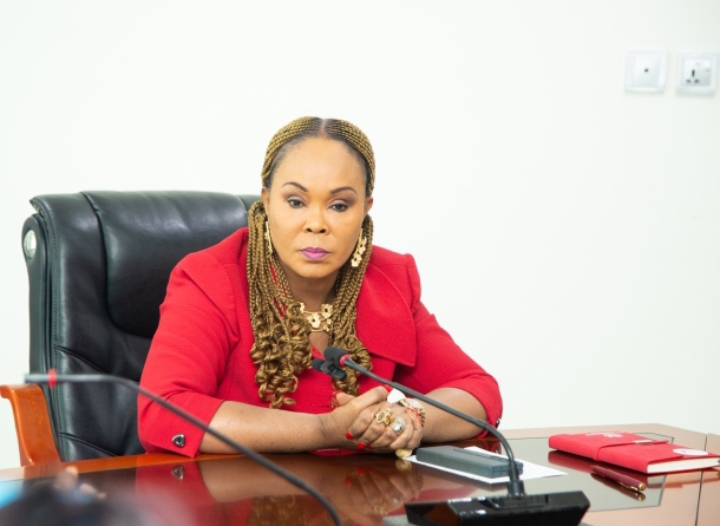Female Genital Mutilation: Women affairs minister, Barr. Uju urges global community to stamp out all forms of harmful practices against girl child
The Honorable Minister of Women Affairs, Barr Uju Kennedy Ohanenye has described the fight to eradicate Female Genital Mutilation (FGM) as a collective responsibility of the entire global community to stamp out all forms of harmful practices against the girl child.
Speaking on this year’s edition of the international day of zero tolerance for female genital mutilation with the theme: “Her Voice, Her Future: Investing in Survivor-led Movements”, the Minister reiterated the Federal Government’s strong intent to eradicate this age-long practice which according her “demeans the dignity and potentials of our women and girls”
“On this International day of Zero Tolerance for female genital mutilation, Nigeria joins the rest of the world to celebrate and acknowledge the courage of survivors of FGM who are fighting back and demanding change by calling for an to female genital mutilation through survivor-led movements.
Speaking on this year’s edition of the international day of zero tolerance for female genital mutilation with the theme: “Her Voice, Her Future: Investing in Survivor-led Movements”, the Minister reiterated the Federal Government’s strong intent to eradicate this age-long practice which according her “demeans the dignity and potentials of our women and girls”
“On this International day of Zero Tolerance for female genital mutilation, Nigeria joins the rest of the world to celebrate and acknowledge the courage of survivors of FGM who are fighting back and demanding change by calling for an to female genital mutilation through survivor-led movements.
In a statement issued by Ohaeri Osondu Joseph, Fnipr, Fcai, Special Assistant, Media, said the Honourable Minister of Women Affairs, Barr Uju Kennedy Ohanenye, said the global push is very pertinent as it spurs girls and women to take action and control of their bodies and futures, claiming what are rightfully theirs”.
She added that the Federal Ministry of Women Affairs’ mandate is to continue to support the empowerment of women and girls and their protection from harmful practices such as female genital mutilation which not only has devastating consequences on their physical and mental health but an economic impact as well.
It will be recalled that the International Day of Zero Tolerance for Female Genital Mutilation, observed annually on 6th of February, provides an opportunity for all stakeholders involved in ending FGM to evaluate achievements, galvanize support and further advocate for abandonment of the harmful practice against the girl child.
FGM in Nigeria is mostly carried out on girls between the ages of 0 and 15 years (91 percent before age 1), showing that girls under the age of 1 year are at the greatest risk of cutting.
Nigeria has the third highest burden of Female Genital Mutilation globally and accounts for 10% of the 200 million women and girls’ survivors of FGM globally, estimated at 19.9 million (UNICEF, 2013; UNFPA 2018).
Despite critical progress being made in eliminating FGM and a significant decrease in national prevalence of the practice, among women and girls aged 15-49 year, due to population growth, impact of COVID- 19 and climate change, UNICEF latest estimates show that global progress to eliminate FGM would need to be 28 times faster than the current pace to reach the target.
This global push is very pertinent as it spurs girls and women to take action and control of their bodies and futures, claiming what are rightfully theirs”.
She added that the Federal Ministry of Women Affairs’ mandate is to continue to support the empowerment of women and girls and their protection from harmful practices such as female genital mutilation which not only has devastating consequences on their physical and mental health but an economic impact as well.
It will be recalled that the International Day of Zero Tolerance for Female Genital Mutilation, observed annually on 6th of February, provides an opportunity for all stakeholders involved in ending FGM to evaluate achievements, galvanize support and further advocate for abandonment of the harmful practice against the girl child.
FGM in Nigeria is mostly carried out on girls between the ages of 0 and 15 years (91 percent before age 1), showing that girls under the age of 1 year are at the greatest risk of cutting.
Nigeria has the third highest burden of Female Genital Mutilation globally and accounts for 10% of the 200 million women and girls’ survivors of FGM globally, estimated at 19.9 million (UNICEF, 2013; UNFPA 2018).
Despite critical progress being made in eliminating FGM and a significant decrease in national prevalence of the practice, among women and girls aged 15-49 year, due to population growth, impact of COVID- 19 and climate change, UNICEF latest estimates show that global progress to eliminate FGM would need to be 28 times faster than the current pace to reach the target.










